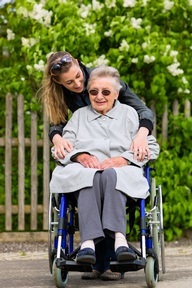Care workers should be recognised as skilled workers post-Brexit
A group of care providers has called for care workers to be recognised as skilled workers, after a government commissioned report recommended restricted access to the UK for unskilled workers post-Brexit.

The report by the Migration Advisory Committee suggests that after Brexit, EU workers should be subject to the same visa rules as other migrants. Currently EU workers have freedom of movement and can travel and work within the European Economic Area (EEA) without visas.
The Committee recommends higher-skilled migrants should have greater access with visas only given to workers earning £30,000 or more. It said it was ‘not convinced there needs to be a work route for low-skilled workers’ from the EU, adding the only ‘possible exception’ to this rule would be seasonal agriculture as 99 per cent of these workers currently come from the EU.
Mike Padgham, chair of the Independent Care Group (ICG) said: "At the end of the day, we have a shortage of care staff in this country and we have to resolve that. The sector relies upon overseas workers, especially those coming to work from other EU countries. We know there is a huge explosion in the number of people needing care ahead of us and it is hard to see how we would operate if the number of carers from overseas was reduced.
"At the same time, the harsh reality facing care providers is not how are we going to manage in 20 years' time but how we are going to staff our shifts tonight, tomorrow and next week.”
He added: “This is easy to resolve: start to recognize social care workers as skilled - which they are - and accept that we need to recruit more from overseas.”
Mr Padgham worries the care system won’t be able to cope, saying: “We already have a frightening number of people - 1.2m and growing - who do not get the care they should and because the sector is starved of funding we are seeing care homes close and home care agencies close or hand back unviable contracts. We can't go on like this any longer."
The Department of Health recently warned that in a ‘worst case scenario’ if EU migrants are barred from coming to the UK there will be a shortfall of 6,000 doctors, 12,000 nurses and 28,000 care staff within five years.
There are estimated to be around 92,000 EU care workers in the UK, making up seven per cent of the care workforce. This varies from region to region, with EU workers being two per cent of the care workforce in the north-east and 12 per cent in London.
The report from the Migration Advisory Committee also said there is no evidence to show increased European migration has damaged life in the UK, saying EU migrants pay more in tax than they get in benefits, give more to the NHS workforce than the healthcare they use, and have no impact on crime rates.
The call for there to be no preferential treatment for EU staff to work in the UK after Brexit represents a missed opportunity, according to the Royal College of Nurses (RCN). Donna Kinnair, acting RCN chief executive, said: “Only last week, vacant jobs in the NHS in England hit a record high. With no long-term strategy to alleviate shortages, the future UK immigration system must be equipped to recruit and keep the brightest and best professionals – patient safety depends on it.”
However she did welcome the call to remove the limit on highly skilled workers from other countries, adding: “The UK has long depended on nursing professionals from around the world and any future cap on their numbers would leave health and social care services unable to recruit the nurses they need.”
Latest News
 29-Jul-24
Dementia Bus gives carehome.co.uk staff insight into life with dementia
29-Jul-24
Dementia Bus gives carehome.co.uk staff insight into life with dementia
 01-Mar-24
Find out the top care homes in 2024
01-Mar-24
Find out the top care homes in 2024
 21-Mar-23
UK's top care homes in 2023 revealed
21-Mar-23
UK's top care homes in 2023 revealed
 03-Jan-23
carehome.co.uk launches free care helpline
03-Jan-23
carehome.co.uk launches free care helpline
 13-Dec-22
5 mins with Emily Whitehurst, chief operating officer for Constantia Healthcare
13-Dec-22
5 mins with Emily Whitehurst, chief operating officer for Constantia Healthcare